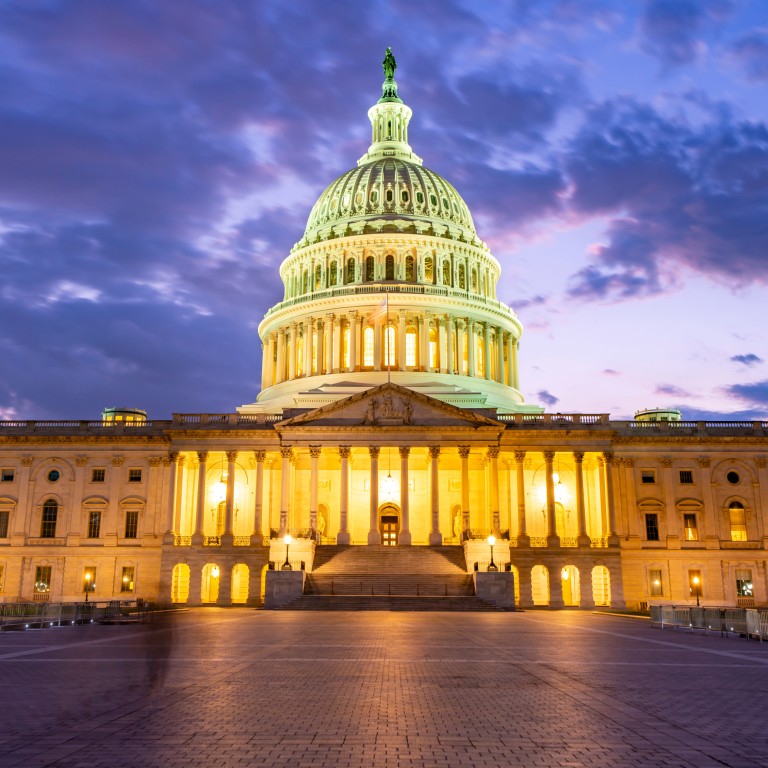
US House panel on countering China urges actions on Xinjiang and Taiwan
- House select committee issues its first set of policy recommendations, addressing the ‘ongoing genocide’ of Uygurs and deterring Beijing from cross-strait attacks
- The bipartisan panel has no authority to draft or amend laws but is tasked with supplying the House with legislative proposals
The House select committee on China released its first set of policy recommendations on Wednesday – intent on acting against the “ongoing genocide” in Xinjiang and deterring Beijing’s military aggression in the Taiwan Strait.
The recommendations – which range from sanctions on Chinese tech companies to improving military coordination with Taiwan – formed the core of two reports, both of which were approved Wednesday by the committee to send to the House.
The first – “The Chinese Communist Party’s Ongoing Uygur Genocide: Policy Recommendations” – was adopted unanimously by voice vote.
The second, “10 for Taiwan: Policy Recommendations to Preserve Peace and Stability in the Taiwan Strait”, was adopted with one “nay” vote, from Representative Andy Kim, Democrat of New Jersey.
The panel, whose formal name is the House Select Committee on the Strategic Competition Between the United States and the Chinese Communist Party, was formed in January and has no authority to draft or amend laws.

But it is tasked with making recommendations to legislative committees before the end of the year. Its members – 13 Republican and 11 Democratic representatives – sit on various House committees with jurisdiction over the recommendations, including armed services and foreign affairs.
On Xinjiang, proposals include restricting US-based retirement and pension funds from investing in sanctioned Chinese companies; sanctioning tech companies used by Beijing “to commit genocide against Uygurs”; strengthening government programmes like Radio Free Asia to promote awareness of China’s human rights abuses; and reducing the “de minimis” threshold for duty-free shipments to the US, which the committee believes may allow companies to circumvent the Uygur Forced Labor Prevention Act.
De minimis provisions exempt products from customs scrutiny if their value is below a certain amount. Closing the “loophole” would be a “big deal,” Representative Mike Gallagher, the Wisconsin Republican who is the committee’s chairman, said.
“We are committed to deterrence in the Taiwan Strait” and “won’t turn a blind eye as the CCP commits genocide, ‘the crime above all crimes’, against the Uygur people,” he said.
US war game on Taiwan shows need for ‘decisive action’ to boost arms
The committee’s Taiwan proposals concerned implementation of the 2023 version of Congress’s primary defence bill – the National Defence Authorisation Act – and legislation that can be incorporated into the 2024 iteration.
On Taiwan, proposals included: increasing purchases and stockpiling of critical munitions to present the People’s Liberation Army with “a more challenging and complex threat environment”; reducing the backlog of missiles and weapons systems approved for sale to Taiwan; developing a joint plan with allies to boost economic engagement with Taiwan; and establishing a planning group between US and Taiwanese forces.
Kim, who serves on the foreign affairs and armed services committees, said he felt the Taiwan recommendations focused too much on security issues and not on “the kind of comprehensive approach that we can be doing”, including on economic and diplomatic fronts as well as “other capacities”.

Gallagher said that the proposals were the result of extensive expert testimony and “difficult compromise”.
“Like any bipartisan report, particularly the current environment we’re in, nobody gets 100 per cent of what they want,” he said.
He emphasised that the reports were “first attempts at our policy process” and “do not represent the last word on either of these issues”.

